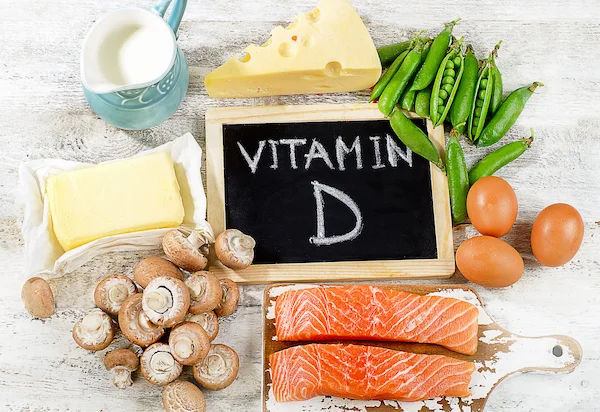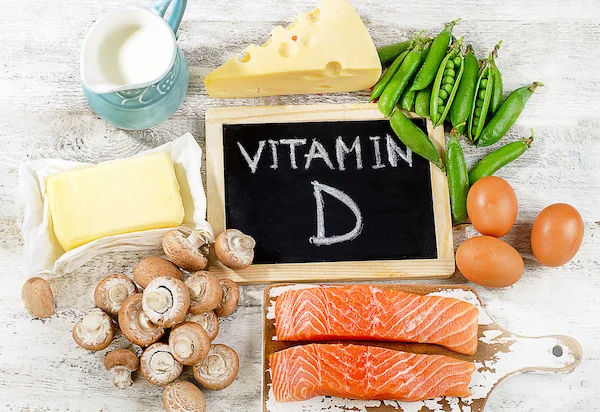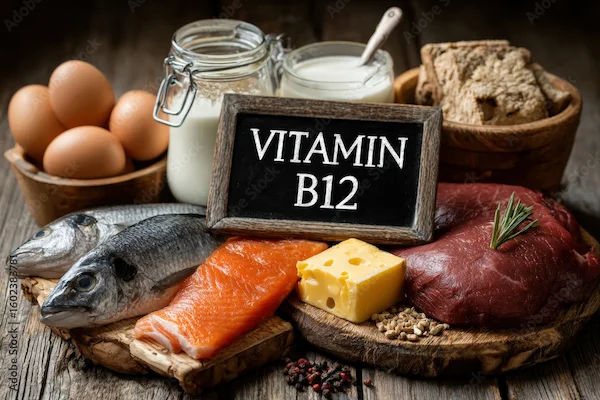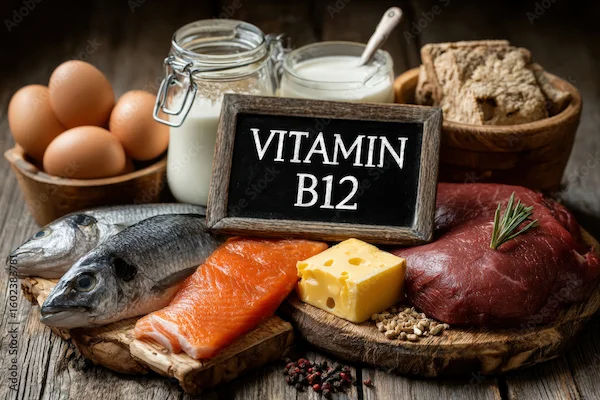Vegetarianism and Vitamin B12 Deficiency Risk
Vegetarians are at higher risk of vitamin B12 deficiency due to limited dietary sources. Understanding this risk helps ensure proper supplementation and prevents associated health problems.

Written by Dr. Vasanthasree Nair
Reviewed by Dr. Rohinipriyanka Pondugula MBBS
Last updated on 8th Aug, 2025

Introduction
If you follow a vegetarian diet, you’re likely enjoying the many health benefits of plant-based eating, such as lower risks of heart disease, diabetes, and high blood pressure. However, one nutrient that can be challenging to get enough of from a vegetarian diet is vitamin B12. This essential vitamin plays a crucial role in your body, and a deficiency can lead to serious health issues.
What is Vitamin B12 and Why is it Important?
Vitamin B12, also called cobalamin, is a water-soluble vitamin that helps:
Keep your nerves and blood cells healthy
Support brain function
Aid in DNA production
Prevent a type of anaemia called megaloblastic anaemia, which makes you feel tired and weak
Unlike some other vitamins, your body cannot produce B12 on its own, so you must get it from food or supplements.
Why Are Vegetarians at Higher Risk of Vitamin B12 Deficiency?
Vitamin B12 is naturally found in animal-based foods like:
Meat (beef, chicken, fish)
Eggs
Dairy products (milk, cheese, yoghurt)
Since vegetarians avoid meat and sometimes dairy and eggs, they may not get enough B12 from their diet. While some plant-based foods (like fortified cereals and nutritional yeast) contain B12, they may not provide enough to meet daily needs.
Who is Most at Risk?
Vegans (who avoid all animal products)
Lacto-vegetarians (who consume dairy but no eggs or meat)
Ovo-vegetarians (who eat eggs but no dairy or meat)
Pregnant or breastfeeding women (B12 is crucial for baby’s development)
Older adults (who may absorb B12 less efficiently)
Consult Top Specialists for Personalised Tips
Symptoms of Vitamin B12 Deficiency
A deficiency can develop slowly, and symptoms may be mild at first but worsen over time. Common signs include:
Physical Symptoms:
Extreme tiredness or weakness
Pale or yellowish skin
Tingling or numbness in hands and feet (nerve damage)
Difficulty walking or balance problems
Swollen, inflamed tongue (glossitis)
Mental & Emotional Symptoms:
Memory problems or confusion
Depression or mood swings
Difficulty concentrating
If left untreated, a severe deficiency can lead to permanent nerve damage, anaemia, or increased risk of heart disease.
Get Your Signs Checked
How to Prevent and Manage Vitamin B12 Deficiency?
The good news is that B12 deficiency is preventable and treatable! Here’s how:
1. Include B12-Rich Foods in Your Diet
If you’re a vegetarian who consumes dairy or eggs, include:
Milk, yoghurt, and cheese
Eggs (especially the yolk)
For vegans, opt for fortified foods such as:
Fortified plant-based milk (soy, almond, oat)
Fortified breakfast cereals
Nutritional yeast (check labels for B12 content)
2. Consider Supplements
If dietary sources aren’t enough, B12 supplements are a safe and effective option. They come in:
Tablets or capsules (sublingual tablets dissolve under the tongue for better absorption)
Injections (for severe deficiency, prescribed by a doctor)
3. Get Regular Blood Tests
Since symptoms can be subtle, a simple blood test can check your B12 levels. If you’re at risk, consider getting tested annually.
4. Be Mindful of Absorption Issues
Some people have trouble absorbing B12 due to:
Pernicious anaemia (an autoimmune condition)
Digestive disorders (celiac disease, Crohn’s disease)
Stomach acid-reducing medications (like PPIs for acid reflux)
If you have any of these conditions, consult a doctor for personalised advice.
When to See a Doctor?
Consult a healthcare provider if you experience:
Persistent fatigue, weakness, or dizziness
Numbness or tingling in hands/feet
Memory problems or mood changes
Unexplained weight loss
They can check your B12 levels and recommend the right treatment.
Conclusion
A vegetarian diet can be incredibly healthy, but paying attention to vitamin B12 intake is essential. By including fortified foods, considering supplements, and monitoring your levels, you can stay healthy and energised.
If you suspect a deficiency or want to check your B12 levels, Apollo 24|7 makes it easy to book a lab test or consult a nutritionist. Stay proactive about your health—your body will thank you!
Consult Top Nutritionists
Consult Top Specialists for Personalised Tips

Dr. Bhukya Pavan Kalyan
General Physician
5 Years • MBBS DNB Paediatrics
Bengaluru
PRESTIGE SHANTHINIKETAN - SOCIETY CLINIC, Bengaluru

Dr. Ramalinga Reddy
General Physician
5 Years • MBBS MD General medicine
Bengaluru
PRESTIGE SHANTHINIKETAN - SOCIETY CLINIC, Bengaluru
Dt. Ila Sharma
Clinical Nutritionist
18 Years • Master in food & Nutrition
Gurugram
VIPUL GREENS - SOCIETY CLINIC, Gurugram
Dr Sumanth R
General Physician
2 Years • MBBS
Bengaluru
PRESTIGE SHANTHINIKETAN - SOCIETY CLINIC, Bengaluru
Mrs Sneha P V
Nutritionist
10 Years • Master of science in Food and Nutrition
Bengaluru
Apollo Clinic, Sarjapur Road, Bengaluru
Consult Top Nutritionists

Dr. Bhukya Pavan Kalyan
General Physician
5 Years • MBBS DNB Paediatrics
Bengaluru
PRESTIGE SHANTHINIKETAN - SOCIETY CLINIC, Bengaluru

Dr. Ramalinga Reddy
General Physician
5 Years • MBBS MD General medicine
Bengaluru
PRESTIGE SHANTHINIKETAN - SOCIETY CLINIC, Bengaluru
Dt. Ila Sharma
Clinical Nutritionist
18 Years • Master in food & Nutrition
Gurugram
VIPUL GREENS - SOCIETY CLINIC, Gurugram
Dr Sumanth R
General Physician
2 Years • MBBS
Bengaluru
PRESTIGE SHANTHINIKETAN - SOCIETY CLINIC, Bengaluru
Mrs Sneha P V
Nutritionist
10 Years • Master of science in Food and Nutrition
Bengaluru
Apollo Clinic, Sarjapur Road, Bengaluru




